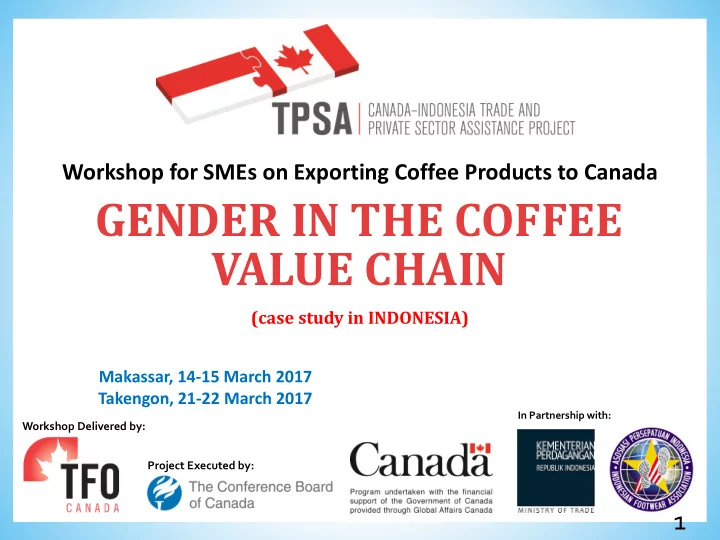

Workshop for SMEs on Exporting Coffee Products to Canada GENDER IN THE COFFEE VALUE CHAIN (case study in INDONESIA) Makassar, 14-15 March 2017 Takengon, 21-22 March 2017 In Partnership with: Workshop Delivered by: Project Executed by: 1
2 GENDER Roles, activities, characteristics, • needs, aspirations (men vis-à-vis women) Assigned by society • Variable by culture, time, circumstance • Can be changed •
Gender Division of Labour in Coffee Production MEN WOMEN Seedling Nursery Nursery Seedling Planting Land Picking- unpaid Picking- paid preparation Upgrading Traders Packaging Training Financial Upgrading Extension Services services 3
Gender Issues in Coffee Production • Often considered as ‘a man’s crop’ • Women’s work and contribution is invisible, unpaid • Unequal pay for work of equal value • Inequitable access to production resources (land, labour, capital) • Lower access of women to formal financial services • Inequitable access to capacity development (training on technology) • Disproportionate burdens of roles (productive and reproductive roles) 4
Gender Issues in Coffee Production • Decision making processes: • In the family (who is the head of the family?) • In the community level (who represent family in farmer groups? In cooperatives? Are there any female farmer groups) • Women have to juggle between reproductive work (household chores, taking care of children, elderly, the sick) and productive work (coffee cultivation, marketing). Women face time poverty. 5
Gender Roles in the Coffee Value Chain Producti Provision Processi Trading of inputs on ng Village processors Local Nurseries markets Region Local Local input Reg’l Regional Collectors Farmers traders markets retailers trader srs Export Cooperatives Exporters markets 6
WHY Consider Gender in Coffee Value Chain? • Both males and females play key roles in activities in coffee production that impact on quality and volume of yield, but their roles, activities, and contributions are different along the value chain. • More males than females are involved in some activities. • Females are involved in some activities even in those where males dominate. • Female participation and contribution in the value chain is oftentimes overlooked and under-valued. 7
Challenges Women Face in Business • Women are not taken seriously by the business environment and by business finance institutions – “we live in a male dominated society”. • Women tend to be more empathetic than men and this is perceived as being less business- like, whereas men think that one should be confrontational to succeed “in a man's world”.
Challenges Women Face in Business • Women tend to be conservative – “men still do the radical stuff” (this from a technology -based incubator programme) – women are not adventurous enough. • Women lack confidence because of their life experiences. • Men's perceptions of women – women have to prove themselves all the time. • Women are, however, perceived as very passionate about their business, which is a key factor of success
Challenges Women Face in Exporting • Limited access to financial services • Lack of information on how to export, about the export market • Double burden
GOOD PRACTICES: KETIARA COFFEE • Estimated 2,578 metric tons/year of Arabica coffee beans exported to US, Europe, Japan, Australia • Woman-led Co-operative: established in 2009 by 38 coffee collectors and traders, and now has 1,768 members(31% F, 69% M) and 1,836 has. Coffee farms. Has female Chairperson, male Secretary-General. • Also Ketiara, Ltd established in 2011 with 970 members (90% F, 10% M). Brand: Queen Ketiara, Nurmawati, etc. • Certification: organic (control union certification) and fair trade (fairtarde international) since 2012 • Ketiara Coop also conducts women ‘me time’ program (facial, massage, dance, sports, etc). Also involving female-headed households (affected by tsunami and/or conflict)
GOOD PRACTICES: KOKOWAGAYO • The idea of making women specific coop was inspired by realizing lack of women needs accomodation in mix-member cooperative • Members: 560 women (2015), and then 350(2016). Expected additional members for 2017 (around 200 members). Reduction of member as impact of violating organic principles (using chemical fertilizer and spraying) • Gaining organic and fair trade certification (USDA, RainForest Alliance, & Organic Certified by the New Mexico Department of Agriculture). • Already exported 16 containers in 2015 and 8 containers in 2016 • Some gender responsive practices : Women access and control over land (Usually farmers have 2 lands: 1 under a. man’s name, and the other/ inherited land goes to women) Child-care facilities which enable women to work longer during also b. harvesting time (to get additional income from working in other lands) Leadership and financial management training for women c. Written agreement with men to give permission to women to work in coffee. d. Men support this practice by realizing higher productivity of coffee produced by women
13
FOR FURTHER INFORMATION, PLEASE CONTACT THE PROJECT OFFICE IN JAKARTA, INDONESIA: CANADA-INDONESIA TRADE AND PRIVATE SECTOR ASSISTANCE PROJECT (TPSA) CANADA CENTRE, WORLD TRADE CENTRE 5, 15TH FLOOR JL. JEND. SUDIRMAN KAV 29-31 JAKARTA 12190, INDONESIA PHONE +62 21 5296 0376, 5296 0389 FAX +62 21 5296 0389 14
Recommend
More recommend